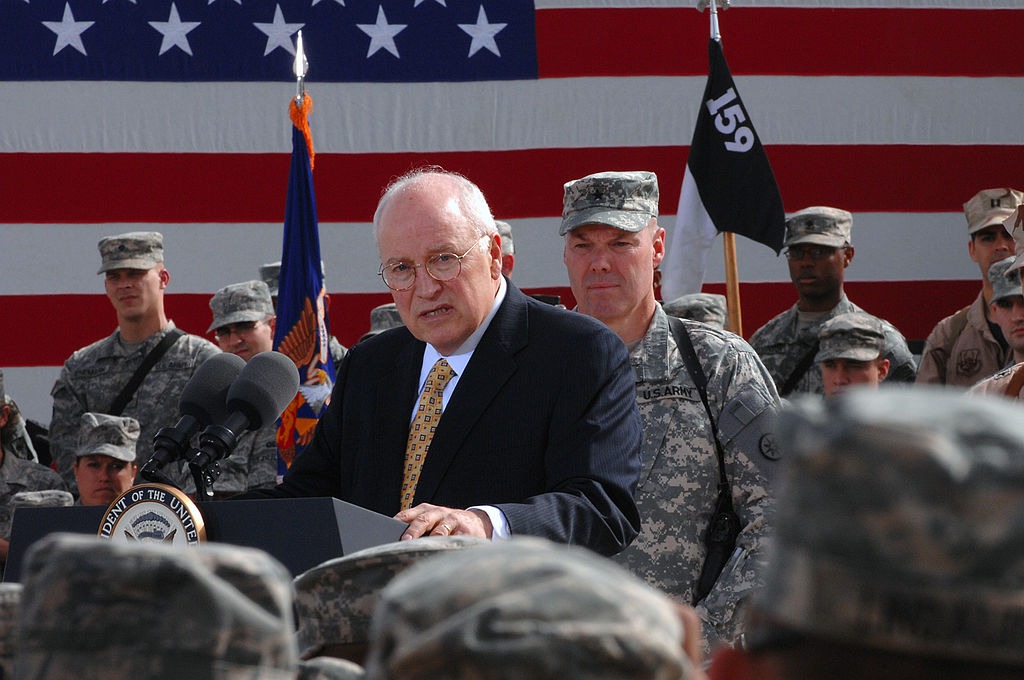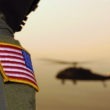Everything about the war — its origins, its course, its failures and achievements — is contested. But it has already been placed in a frame that portrays it, like U.S. wars in Korea and Vietnam, as a mistake born of good intentions, ennobled by brave soldiers and mangled by confused and self-interested politicians. A small number of neocons like William Kristol and the Fox News crowd insist that it is a victory, but the American public and most political and opinion elites are not buying that narrative. A CNN poll early this year found two-thirds of Americans opposed to the war, a consistent finding over several years.
The war — which really began with Operation Desert Storm in 1991 and continued with the sanctions that constricted Iraq for 12 years more until the coup de grâce of regime change has always been gauged by the American public in the metrics of blood and treasure, namely, our blood and our treasure.
How many Americans have died, or been wounded? How much money has been spent? This is typically the sole measure of the costs of war especially a war fought on false premises and these costs and false rationale in large part account for the growing dissatisfaction with the conflict. But the tragic result for thousands of U.S. soldiers, contractors, aid workers, and journalists is a thin slice of the fundamental reality of the war, which has been its colossal destructiveness.
Consider a few statistics
The provision of health care in Iraq is guaranteed in the Iraqi constitution, but more than half the doctors in pre-war Iraq are gone (emigrated or killed), and the ratio of nurses to doctors, which should be three to one, is only one to one. The Red Cross also reports that health care delivery in rural areas is dire, and “poor hygiene levels in many facilities have a severe impact on the quality of care delivered. Frequently, minimum standards of nursing, sterilization and waste management are not respected owing to a lack of resources.”
Enrollment in schools has steadily declined since 1990.
An estimated 3.5 million to 5 million Iraqis were displaced by the war, either within Iraq (internally displaced persons, or IDPs) or in Syria, Jordan, and elsewhere. Between 2008 and last summer, only 622,000 displaced people had returned, according to U.N. refugee officials. They somberly noted last July that “an estimated 1.3 million IDPs are in Iraq; 467,565 IDPs and destitute persons reside in 382 settlements countrywide. The conditions in the settlements are extremely poor.”
Shortages of clean water, sanitation, and electricity remain a problem, in some places quite severe. In 2010, UNICEF estimated it needed $50 million to improve health care access, sanitation, etc., for Iraqi children; it was able to raise only $7 million.
Thousands of women and girls have been driven into prostitution, or kidnapped and forced into sexual slavery; rising Islamic militancy has stripped the rights of millions more. The government reported in 2009 that 750,000 widows are living in poverty.
This autumn, the U.N. Special Representative for Iraq described economic conditions as deteriorating and the status of human rights activists in Iraq as “fragile and miserable.” More than half of all Iraqis live in “slum conditions,” compared with 17 percent in 2000. By a 2-to-1 margin, Iraqis told a Gallup pollster this September that the economy is worsening, and by a large margin they also said that their standard of living is crumbling.
The number of people who have died in Iraq as a result of the war is a topic of some controversy, but virtually all independent observers agree it is in the hundreds of thousands, possibly as many as a million. Two separate household surveys conducted in the spring of 2006 found that between 400,000 and 650,000 “excess deaths” the number above the pre-war mortality rate had occurred in Iraq as a result of the war (counting all Iraqis, not only civilians, from all causes of death). Those surveys were taken at the height of violence; much more mayhem and destruction was to come.
This extraordinary level of war death came on the heels of 12 years of sanctions in which an estimated 500,000 children perished — a toll, said Secretary of State Madeleine Albright, that was “worth it” to punish and contain Saddam Hussein.
Grim history
The statistics translate into a grim history, an “epistemology of war,” as General William Tecumseh Sherman said of his own rampage in the American Civil War. We should know this war by what these statistics and these reports tell us. But we bury these numbers, these accounts, saying it’s “a mess” and moving on. If ordinary media coverage is any guide, Iraq scarcely exists for Americans any more. In 2010, only 1 percent of the news coverage in major dailies and television mentioned Iraq. Prominent journalists routinely describe the violence in Iraq in mild terms for example, that “tens of thousands” were killed and very rarely discuss the ongoing refugee crisis and other deadly and persistent consequences of the U.S.-instigated conflict.
With such little attention paid, so few retrospectives or reflective analyses, the war’s meaning is virtually a blank slate. Or is it? Right-wing supporters of the war are busy claiming victory, defending the decision to invade, or even claiming that the George W. Bush “democratization” agenda (which was at best a secondary rationale for war) was the spur to the Arab Spring of anti-authoritarian revolts. If we believe that merely “tens of thousands” died in Iraq with no reference made to the displaced, the impoverished, and the uncared for — then the claim that it was worthwhile to get rid of Saddam sounds more plausible.
It is on these grounds that the “meaning” of the Iraq war will be assessed as the last U.S. troops depart (if they do) in the coming weeks and months. We are conditioned to grasp events through our national narratives, the stories we tell ourselves about the essence of America. What is most redolent for European-origin Americans, and has been for hundreds of years, is the “frontier myth,” in which we tame the wilderness, subdue the savages, and reap the bounty — often violently — while implanting democratic values on this contested terrain.
This was not only the animating narrative of continental expansion in North America, but, beginning in the early 20th century, it was the one that drove and justified U.S. global reach. The Iraq war and this national narrative are nearly a perfect fit. Hence the anxious claims of victory, of bringing democracy and free markets, of American bravery, of vanquishing terrorists and, importantly, the concomitant disavowal of the morally confusing scale of civilian suffering.
We recall the American sacrifice, the good intentions, and the ungrateful natives, but we suppress from memory the sheer chaos and ruin our interventions caused. The same was true for the wars in Korea and Vietnam. In both, two million to three million died, and millions more were made homeless, with toxic physical and psychological effects that have lingered for decades. Our national narrative as embodied by the Korean War Memorial and Vietnam War Memorial on the National Mall in Washington does not bother to mention the Korean and Vietnamese peoples.
Because we pay so little attention to the actual scale of destruction, displacement, and death, we can pretend that our involvement was more benign than it actually was. This is a dangerous habit, one ingrained in our politics and our social discourse about war. The moral hazard is perhaps obvious: we are walking away from our responsibilities to account for our own destructiveness. Legally, we are obligated as an occupying power to provide security and protect civilians, which has not occurred. Strategically, the United States — while not held accountable by the American public — risks “reputational costs” because the U.S. is viewed by many, particularly Muslims, as reckless and callous. And politically, this abiding habit of forgetting is dangerous because when the next call to arms come round, as it will, we will not have the memory of war’s real consequences to stay our hand.
John Tirman is author of The Deaths of Others: The Fate of Civilians in America’s Wars (Oxford University Press). He is executive director and principal research scientist at the MIT Center for International Studies.







0 Comments